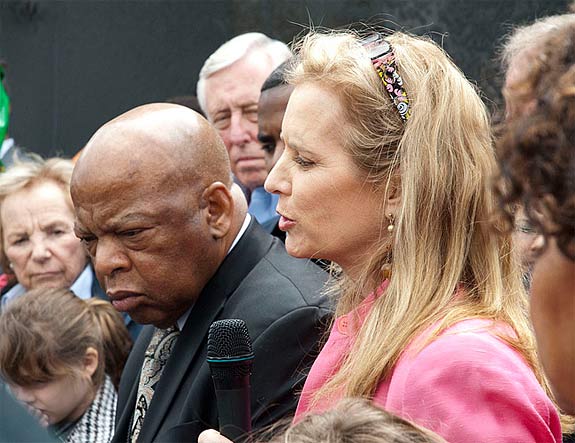Immigration Law is Reminder of the Past
On April 25, 1963, my father, Robert F. Kennedy, then the U.S. attorney general, came to Alabama to ask Gov. George Wallace to stop discriminating against black people. That morning, Wallace raised the Confederate battle flag over the Capitol, where he and my father would meet. His answer would be "no."
On April 25, 1963, my father, Robert F. Kennedy, then the U.S. attorney general, came to Alabama to ask Gov. George Wallace to stop discriminating against black people. That morning, Wallace raised the Confederate battle flag over the Capitol, where he and my father would meet. His answer would be "no."
I was recently invited to dinner at the Alabama Capitol by the state's current governor. I was part of a group led by U.S. Rep. John Lewis that has come to commemorate "Bloody Sunday," the day in 1965 when state troopers beat civil rights marchers as they crossed the Edmund Pettus Bridge in Selma.
Thankfully, the Confederate flag no longer flies over the Capitol. It was removed almost 20 years ago to symbolize that Alabama had put its racist days behind it. But, today, a dark shadow hangs over the state nonetheless.
I'm talking about HB 56 — the nation's most draconian antiimmigrant law that was passed last year. It's designed, as its sponsors proudly admit, to torment and terrify undocumented immigrants and their families into "self-deporting." Written by outsiders for a state with, ironically, one of the smallest populations of undocumented immigrants in the country and propelled by debate that used the terms "Hispanic" and "illegal immigrant" interchangeably, the law has had a horrific effect.
The Southern Poverty Law Center has fielded more than 5,000 hotline calls for help since HB 56 passed last June. Its February 27 report chronicles just some of the law's worst intended and unintended consequences:
- A mother involved in a minor traffic stop was handcuffed, taken into custody and her toddler separated from her because she was unable to prove on the spot that she is married to a U.S. citizen and that formal adjustment of her immigration status is pending;
- A family was denied water service for 40 days because their "papers" weren't in order;
- A sick young girl was refused treatment at a medical clinic solely because of her immigration status, leading to emergency surgery several days later.
One national radio program even documented an ugly incident at an Alabama high school in which Latino students sitting near the front of a pep rally crowd were met with chants of "Mexicans to the back!"
Alabama's legislative and executive branches might just as well have decreed that the state take a giant step backward on the road to human rights and economic progress. Scores of news reports make clear that HB 56's callous disregard for the legal rights of U.S. citizen immigrants in Alabama, and for the human rights of the undocumented, will take an enormous toll on the state's economy.
Dr. Samuel Addy, director of the Center for Business and Economic Research at the University of Alabama, estimates the state stands to lose tens of thousands of jobs, billions of dollars annually in economic activity and as much as $1 million each day in tax revenues.
Despite the violence they faced on "Bloody Sunday" in 1965, the marchers knew there was no going back — not to the "safe" side of the bridge, not to the despair of the Jim Crow South, not to the back of Rosa Parks' bus or to the back of any other place.
When I followed in their footsteps across the Pettus Bridge, forward with others who continue to fight for human rights in America and around the world, I prayed and marched for the terrified kids in that hatepolluted high school gym, for all of Alabama's undocumented families and for every other undocumented person in America who dreams of and deserves a humane and legal path to citizenship without fear of abuse or deportation, "voluntary" or otherwise.
The lesson of "Bloody Sunday" in 1965 is clear. "Back" is unacceptable and, ultimately, un-American. Like the Confederate battle flag, HB 56 must go.
Kerry Kennedy is the author of Speak Truth to Power and president of the Robert F. Kennedy Center for Justice & Human Rights.


